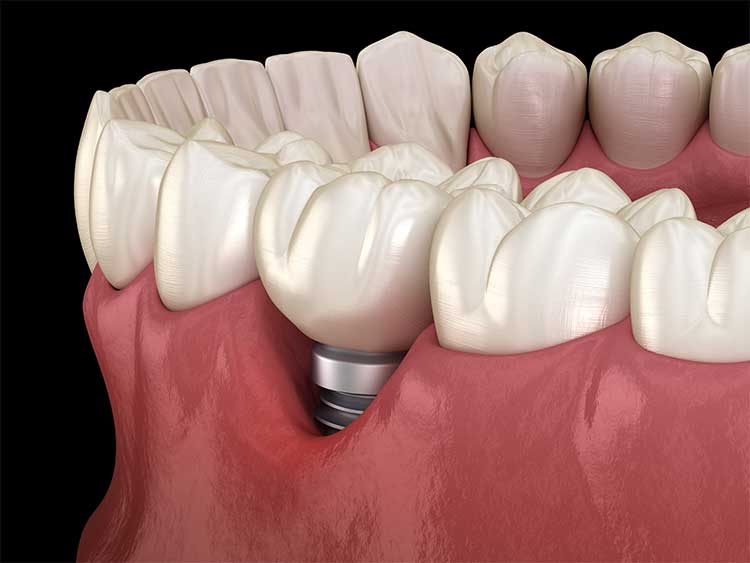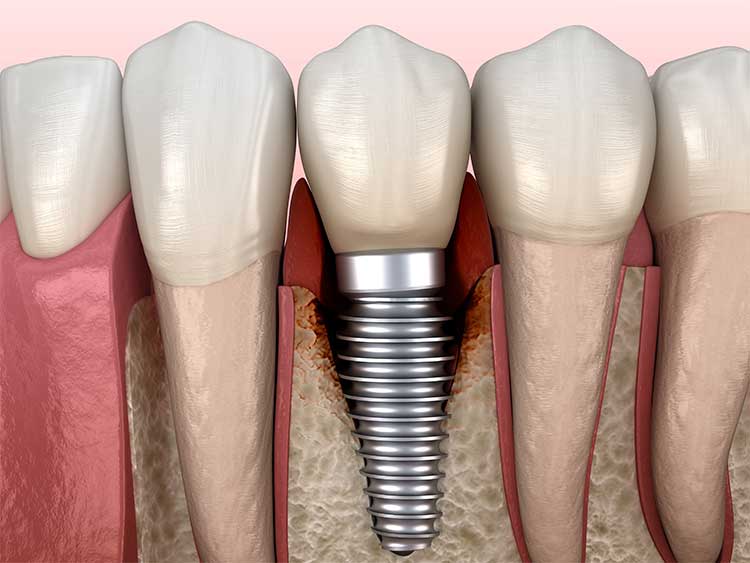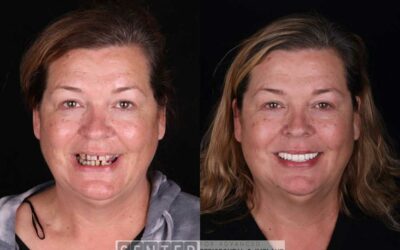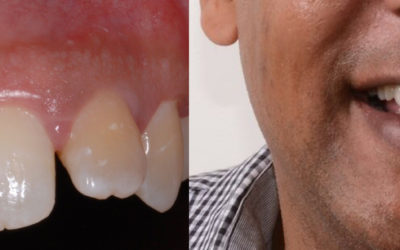How To Prevent An Infection After Getting Dental Implants
One of the leading causes of implant failure and dental implant infections is inadequate home care. Fortunately, preventing dental implant infections is fairly straightforward, and it starts with treating your dental implant like an anatomical tooth. Understanding how your oral health and gum tissue revolve around good oral hygiene is the first step to preventing dental implant failure.


What is Peri Implant Mucositis?
Peri-implant mucositis, more frequently referred to as “peri-implantitis,” is the implant form of gum disease (periodontal disease.) It involves an infection around the implant site at any point following your dental implant surgery. Typically, the tissues mimic symptoms of gum disease, including red, swollen gums, or bleeding gums.
Peri-implantitis is when the gums immediately around your dental implants become infected. Typically, it’s because of inadequate oral hygiene, such as not knowing how to brush or floss implants properly. As infection-causing bacteria accumulate along your implants and natural teeth, the gums in those spaces become inflamed. If we don’t stop or prevent infection quickly, it can cause dental implant failure or loss.
Working with an implant periodontist like Dr. Krivitsky and Dr. Aalam, who both have advanced training and understanding of the connection between the gum, teeth, and underlying bone, will help you reduce your risk of infections, especially since some types of dental implant infections may tie back to the placement, techniques, and type of restorations that your dentist uses.
Symptoms of peri-implantitis include things like
- A bad taste in your mouth
- Bleeding gums
- Swollen, red gums
- “Pockets” under your gums, around your dental implants
- Implant mobility
- Visible bacteria buildup (tartar, plaque)
You’ll find that similar symptoms in other parts of your mouth can also develop around natural teeth. Patients who have such symptoms may have co-existing periodontal disease. Since the same types of bacteria trigger both infections, home care is consistent for implants and teeth alike.
Initial Healing Process After Implant Surgery
Dental implant surgery is relatively minimally invasive. The post-operative instructions are similar to what you might receive if you’re having a tooth extracted or other oral surgery, such as eating soft foods, applying a cold compress to the side of your face, and gently brushing around the area after a few days have passed. In the meantime, you can remove food particles by rinsing with a warm saltwater solution to alleviate the swelling.
Most people require little to no pain medication after getting dental implants installed. Your body’s ability to adapt to this minimally-invasive procedure is what makes it a great option for anyone with missing teeth. However, anyone can develop a dental implant infection if they do not follow their home care instructions properly or take medication as directed (such as antibiotics). The risk of infection is low, but it could cause your implants to fail.
Whenever someone undergoes surgery for dental implants, they can typically get back to their normal routine within a day or two. So you likely won’t need to take off from work or school. But it’s best to avoid rigorous exercise for at least a week or two.
Preventing Peri-Implantitis After Recovering from Surgery
Scheduling a professional cleaning every six months is essential to keep your teeth and dental implants healthy. Even if you brush and floss fairly well, an infection like gingivitis or peri-implantitis can form. During regular checkups, your dentist can identify signs of buildup and discuss how to keep your implants as clean as possible. With good routine preventative care, we can intercept earlier problems before there’s a risk of major implant complications.
Closely follow your dentist and hygienist’s recommendations, including regular brushing and flossing around each implant and fixed restoration. Most importantly, always clean along the gumlines and next to your implants. A water flosser will be especially useful because of how well it can reach between implants, teeth, and just under the edges of your gum tissues.
Nonsmokers make the best dental implant candidates, as smoking or tobacco use can reduce your treatment success rate. If you can quit, do. Avoiding smoking will ensure your implant site is healthier, gum tissues stay intact, and bone loss can be avoided. In addition, smokers with missing teeth are at a higher risk of infection. Even though they aren’t the same as natural teeth, dental implant infections paired with smoking will significantly lower your long-term success rate.
Is it Possible to Treat a Dental Implant Infection?
Yes. But typically, you will want to see a specialist. To treat your dental implant infection, you’ll need more than a routine checkup or dental cleaning. Our expert dentists may need to prescribe certain medications, perform soft tissue therapies, or even restore your dental implants months after they were installed. Left untreated, you will suffer complete implant/tooth loss in those areas.
You’ve invested a lot of time in your new smile. The last thing you want is to develop preventable infections in your mouth. Unfortunately, it’s not as easy as taking antibiotics to correct. What we’ll need to do is physically remove all of the bacteria around the implant to establish a clean environment. We’ll show you how to modify the way you’re brushing and flossing around your implant so that bacteria doesn’t accumulate in that part of your mouth.
Once we have bacteria levels under control, your gums will improve naturally. However, there are situations where there might be severe infections where the implants need to be removed altogether. Our periodontal specialists can keep this risk to a minimum as long as we quickly intercept the symptoms mentioned earlier.
Our Los Angeles Implant Team Can Help
Our dental implant patients can safely prevent dental implant infections with the proper knowledge and oral hygiene habits. But if you do have an infection after dental implant surgery, our implant dentist can help you get your oral health back on track.
Whether you’ve recently had oral surgery, have a compromised immune system, or your dental implants refuse to heal properly, we encourage you to call The Center for Advanced Periodontal & Implant Therapy. Our Los Angeles periodontists can help treat an infected dental implant, even if we were not the ones who installed it originally. Contact our office today for more information.
You May Also Like...
Elevating Dental Implant Standards in Los Angeles for Patient Safety
Sarah's Implant Journey: A Testament to Transformation Meet Sarah. Three years ago, Sarah avoided mirrors, rarely...
Comparing Immediate Load vs. Traditional Dental Implants
Dental implants have revolutionized the way we replace missing teeth. They're not just prosthetics; they restore the...
Overcoming Dental Anxiety for Fear-Free Dental Implants
Dental anxiety is a common concern shared by many patients. It's not just about the fear of pain; it's also about the...



